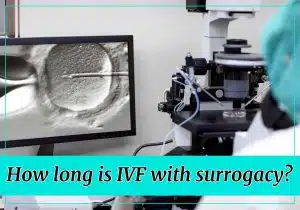When a woman can’t get pregnant for any reason such as having a low ovarian reserve or any specific genetic condition that prevents her from pregnancy, the best suggestion from fertility specialists is IVF and surrogacy. In this article on the TebMedTourism, we are talking about IVF (In Vitro Fertilization) and surrogacy in Iran;
A special offer and method that can help couples who are expericining not having a child by natural pregnancy. For this process having the right and accurate knowledge, understanding of the treatment process, timeline for this process, and costs is very essential. inhance, it will help you weigh your options and make the best decision. Our promise is helping and staying with you to the end and try our best having the best experience in this vital and precious process.
IVF and surrogacy difference
To find the differences between IVF and surrogacy should first get to know these techniques and procedures. So one of the essential things is information and data about IVF or surrogacy. Furthermore, in this article, TebMedTourism’s physicians answer your questions in all stages of treatment.
Our physicians guide you to comprehend the advantages of surrogacy with IVF and the best path to having a healthy child at the end of the fertility journey and experiencing parenting.
What is IVF?
A series of complex treatments known as in vitro fertilization (IVF) are used to aid fertility, prevent genetic problems, and conceive a child. In (IVF), mature eggs are removed from the ovaries and fertilized with sperm in a laboratory. The fertilized egg is carried to the uterus (of the biological mother or surrogate). An IVF cycle is completed in about three weeks.
The success rate of IVF in Iran
IVF can be expensive, cumbersome and time consuming. In (IVF), multiple embryos can be placed in the uterus, resulting in multiple fetuses (multiple gestations). Success rate of IVF in Iran is very high and a qualified and professional doctor will be with intended parents to help them understand all the procedures. Especially TebMedTourism experts accompany you at every stage of your trip and journey.
What is surrogacy?
In general, surrogacy is an arrangement in which a woman (the surrogate) agrees to carry and give birth to a child on behalf of another couple. Numerous infertile couples worldwide signed contracts with TebMedTourism because we are one of the best specialised agency for commercial surrogacy in Iran. The TebMedTourism, as a facilitator, will help intended parents and surrogates cross these paths safely.
IVF and surrogacy
So the TebMedTourism’s specialists create an embryo with prepared sperm and egg of intended parents in the lab and carefully implant it into a surrogate. This way is a fertility procedure with high success rates. When a surrogate is a woman who isn’t the biological mother or egg donor, this surrogacy will be called gestational surrogacy.
There are fewer legal difficulties because the gestational carrier, who is also known as a surrogate, is not genetically linked to the child in any way. Hence most physicians prefer and advise gestational surrogacy. Therefore, there are no legal concerns about this method, and fertility agencies follow up on IVF and surrogacy procedure more quickly.

IVF TimeLine
This timeline that mentioned above is when the egg donor is the biological mother. However if doner/s available the TebMedTourism is able to do this procedure less than a month.
Step 1: Medical experiments on egg donor Once the egg donor (which could be the intended mother) is ready, our clinical coordinator will contact the egg donor to arrange for her to visit our IVF specialist in person for a medical screening. Review of the donor’s medical history, psychiatric evaluation, and genetic risk assessment
- a thorough medical background
- a pelvic or physical examination
- A particular pelvic ultrasound checking of her ovaries
- comprehensive blood testing, including genetic carrier screening and an infectious panel
- a drug test using urine
The average time for receiving all the results is 14–21 days. If every test shows no abnormalities, the donor will be regarded as a strong candidate prepared to begin therapy, and the other stages will be continued.
Step 2: collecting Semen Fertility specialists in the TebMedTourism will work with the father to obtain semen to generate embryos once and mother (egg donor) is ready. We can use fresh semen on the day of egg retrieval or we can use frozen semen samples for your IVF treatment at a later time.
Can sperm be collected at home for IVF?
The answer is yes. It is safe without any adverse effect on treatment results for IVF. The gathering of sperm is effortless without any pain, so you can trust our specialists and leave the work to them.
Step 3: legal contract with intended parents For legal contracts, intended parents for IVF and surrogacy contracts and initial agreements should have the necessary interactions with the TebMedTourism experts. Depending on the legal requirements of both parties, this process could take just a few weeks or a few months.
Step 4: A cycle of egg retrieval and stimulation The average duration of the egg retrieval stimulation cycle is 10-14 days, but each case is donor-dependent. This time frame begins when the donor begins ovarian stimulants (by particular medications used for this process) until egg retrieval.
Step 5: Fertilization A fertilization report will be created the day after fertilization. Fertilized embryos are cultured for 5-7 days before being biopsied and sent for PGT (preimplantation genetic testing). It takes 1-2 weeks to get the final embryo results.
Step 6: transferring embryo into surrogate In the United States, success rates in similar cases range from 75% to 85% for embryo transfer using high-quality embryos. The TebMedTourism, by choosing the best and the most appropriate surrogate and utilizing strong embryos, definitely will increase the success rate highly and in this way is relying on their specialist and accurate experiments.
Can you do IVF with a surrogate?
Costs of IVF and surrogacy
The frequent question is “how much does it cost to do IVF with a surrogate?”. Stay with us to answer this important question! The costs of IVF and PGD tests in Iran is very low and is about $6,000 to $7,500. If the surrogacy process adds to this procedure, the costs change to $21,000-$36,000.
Advantage and disadvantage of IVF surrogacy
The knowledge of the Pros & Cons/benefits and damages of IVF surrogacy is essential. This information helps intended parents and surrogates make right decisions. Several factors are involved as below:
Factors that lead to advantages
First of all, we should say that IVF is most advantageous for women over the age of 35, circumvents infertility problems, and after that for:
- fewer intrusions
- best when the severity leads to the tube damage
- Option of leveraging conception chances
- Options for using donated eggs and/or sperm if couples experience issues
- Poly-cystic Ovary Disease PCOS/PCOD
- Effective in Endometriosis condition
- Overcomes Premature Ovarian Failure
Factors that lead to disadvantages
- Age requirements
- Dual infertility (male and female) due to ovarian aging and sperm quality difficulties
- The extent of the tubal injury
- before undergoing IVF therapy, the fallopian tube’s condition
Please consider that these negative factors that explained above is not happening to all women who wish to have IVF and depends on the body’s ability to withstand and respond to artificial ovarian stimulation. When the procedures are including surrogacy, withstanding of the surrogate’s body will be checked. On the other hand, the clinical problems should be considered because that issue can damage the surrogate mother or embryo that is prepared for IVF.
- clinical dysfunction
- inexperienced IVF specialist
- Below-average infrastructure and facilities
- untrained staff
The above list is non-compliant parameters for fertility clinics, but with TebMedTourism, you should safely entrust the work to our agency. We check all the factors precisely. The conclusion is the best, and you can ask the patients that experience IVF and surrogacy with us.
Are Advantages more than disadvantages?
Absolutely, yes. IVF has many benefits. Couples who are looking for the best IVF centers in IRAN, can rely on the TebMedTourism agency, our certified team and experienced physicians to achieve their goals. Our doctors in the TebMedTourism are certified, updated with the most accurate international and standard knowledge. For procedures, along with our expert physicians, The TebMedTourism uses the best and most modern clinics/hospitals with certified healthcare team. Therefore, we invite you to Iran visiting and utilizing the TebMedTourism having the best medical experience and hospitality of your life.
TebMedTourism Company
We are here to help prospective parents understand the benefits of IVF surrogacy and whether if it is suitable for their fertility journey. Are you ready to start discussing about reproductive options? If your answer is yes , please get in touch with us or make an appointment for a family-raising seminar that includes information on surrogacy and other fertility options. Fulfil your dreams of starting a family with a surrogate that gives couples the chance to start a family and having great time with a lovely child!
What is the difference between IVF and surrogacy?
IVF (in vitro fertilization) involves the fertilization of the egg outside the body. In contrast, surrogacy is implanting embryos (made by IVF procedure) into the surrogate’s womb.
How long is IVF with surrogacy?
IVF cycles usually last four to six weeks. The gestational surrogate is given hormones to regulate her cycle at this time. That process takes around two months to complete, followed by nine months of a normal pregnancy. Overall, it takes 12 months to complete all the steps.
Can you do IVF with a surrogate?
Despite the fact that IVF and surrogacy are two separate processes, their combination results in the successful birth of a child. IVF is a procedure that fertilizes the eggs that have been collected from the biological mother (egg donor) and transfers them to the womb of a surrogate.













